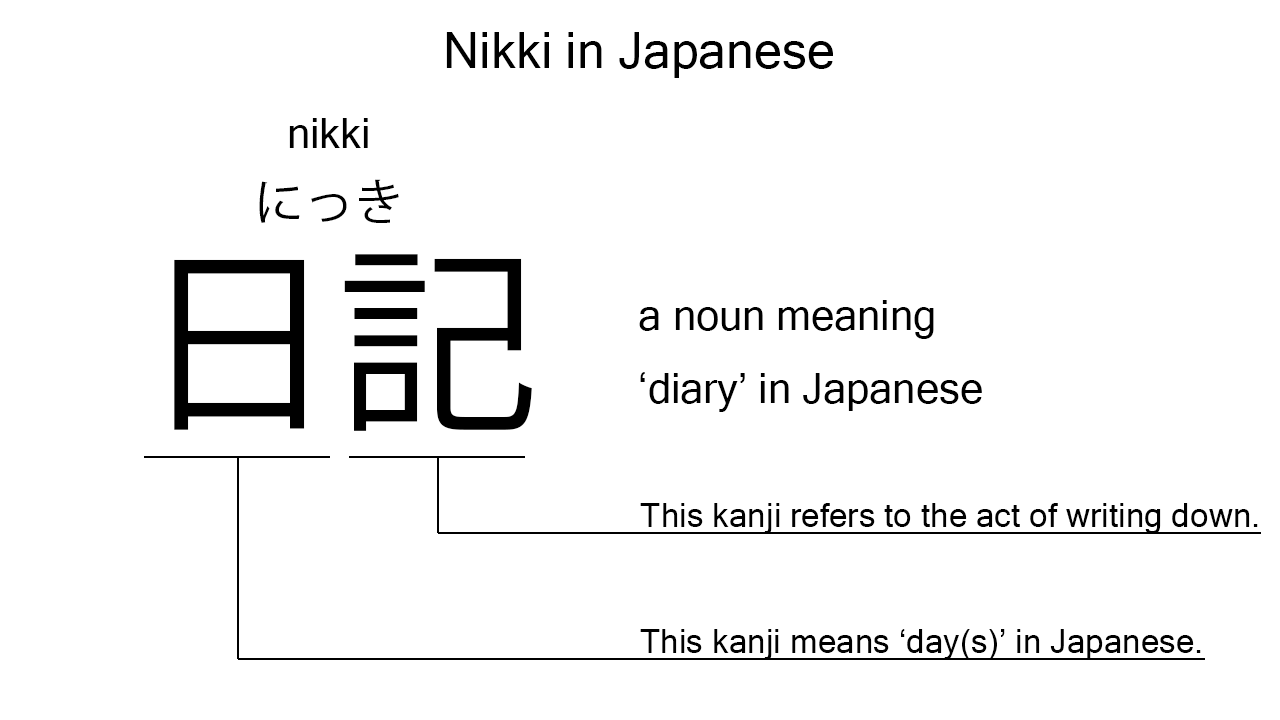What does “nikki” mean in Japanese?
Native speakers say “nikki” to mean ‘diary’ in Japanese. Perhaps, some Japanese learners know this word as it is sometimes used in Japanese movies, songs, novels, manga, anime, and the like. In this blog post, however, I will explain this word in detail based on its kanji expression. And also, I will explain how to use it through example sentences. My explanations would help Japanese learners understand “nikki” more clearly. Then, let’s get started!
Contents
Definition and meaning of “nikki”
Let me start with the definition and meaning of “nikki”.
- nikki – 日記 (にっき) : a noun meaning ‘diary’ in Japanese. This can also work as plural. Learn more about Japanese plural.
The definition and meaning are simple and clear. To understand this noun more clearly, however, let me explain its kanji characters in detail, one by one.
Nikki in kanji
The kanji expression of “nikki” consists of the following two kanji characters:
- 日 : a kanji character widely used to mean ‘day’ in Japanese.
- 記 : a kanji character used to refer to the act of writing down.
These two kanji characters tell us that the formed noun literally means ‘daily writing down’ in Japanese. This literal interpretation is very close to the actual meaning.

When we meet new kanji expressions, we should check their kanji characters in detail to understand their meanings clearly and deeply. In many cases, kanji characters tell us a lot about the meanings of the expressions they form. Actually, here, we could get the better understanding of “nikki” through the detailed kanji check above.
So far, I’ve explained the definition and meaning of “nikki” together with its kanji characters. Then, let me explain how to use it through the example sentences below.
Example #1: how to say “diary” in Japanese
kore ga watashi no nikki desu – これが私の日記です (これがわたしのにっきです)
This is my diary.
Below are the new words used in the example sentence.
- kore – これ : a pronoun used to refer to a thing close to the speaker. In the example, this is used to say “this” in Japanese.
- ga – が : a case particle used to make the subject word or the object word in a sentence. In the example, this is used after “kore” to make the subject in the sentence.
- watashi – 私 (わたし) : a pronoun meaning ‘I’ in Japanese.
- no – の : a case particle used after a noun or pronoun to make its possessive case. In the example, this is used after “watashi” to make its possessive case, “watashi no“, which means ‘my’ in Japanese.
- desu – です : an auxiliary verb used after a noun or adjective to make it polite. Probably, this is well known as a part of Japanese desu form. In the example, this is used after “watashi no nikki” to make it sound polite.
This is a typical usage of “nikki”. In this example, it works as a part of the noun phrase, “watashi no nikki”, which means ‘my diary’ in Japanese.
Example #2: another usage of “nikki”
boku wa mainichi nikki wo kaki masu – 僕は毎日日記を書きます (ぼくはまいにちにっきをかきます)
I write in a diary every day.
Below are the new words used in the example sentence.
- boku – 僕 (ぼく) : a pronoun meaning ‘I’ in Japanese. This is used mainly by boys and young males.
- wa – は : a binding particle working as a case marker or topic marker. In the example, this works after “boku” to make the subject in the sentence.
- mainichi – 毎日 (まいにち) : a noun meaning ‘every day’ in Japanese. This can also work as an adverb almost anywhere in a sentence. In the example, this works as an adverb in the middle of the sentence to say “every day” in Japanese.
- wo – を : a case particle used to make the object word in a sentence. In the example, this is used after “nikki” to make the object in the sentence.
- kaki – 書き (かき) : one conjugation of the verb, “kaku”, which means ‘to write’ in Japanese. In the example, it has been conjugated for the better connection with its following word.
- masu – ます : an auxiliary verb used after a verb to make it polite. Probably, this is well known as a part of Japanese masu form. In the example, this is used after “kaki” to make it sound polite.
This is another typical usage of “nikki”. In this example, it works as a part of the commonly-used phrase, “nikki wo kaki masu”, which means ‘to write in a diary’ politely in Japanese.
Summary
In this blog post, I’ve explained the definition and meaning of “nikki” in detail based on its kanji expression. And also, I’ve explained how to use it through the example sentences. Let me summarize them as follows.
- nikki – 日記 (にっき) : a noun meaning ‘diary’ in Japanese. This can also work as plural. These two kanji characters literally mean ‘daily writing down’ in Japanese. This literal interpretation is very close to the actual meaning.
Hope my explanations are understandable and helpful for Japanese learners.